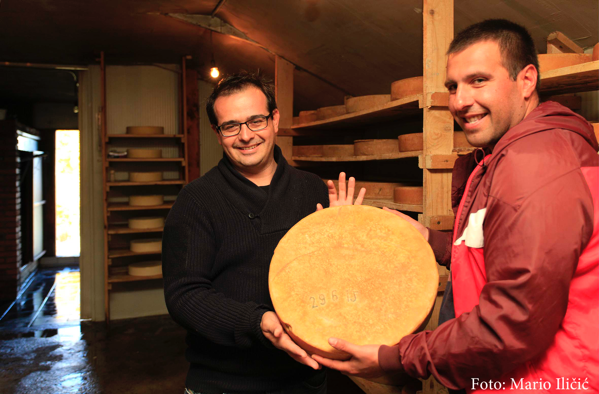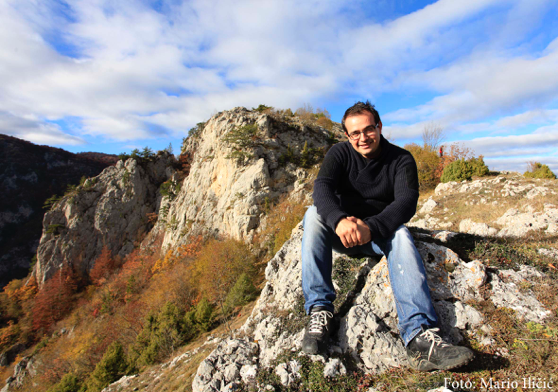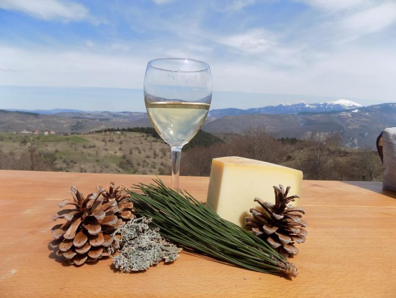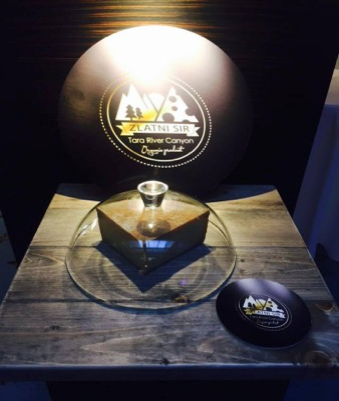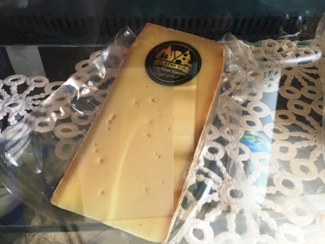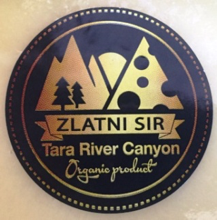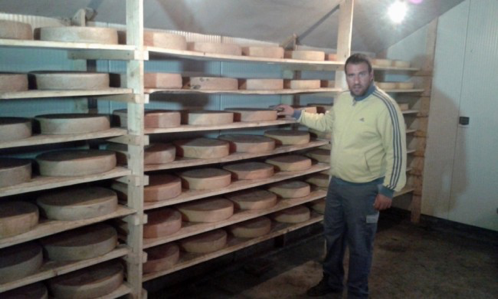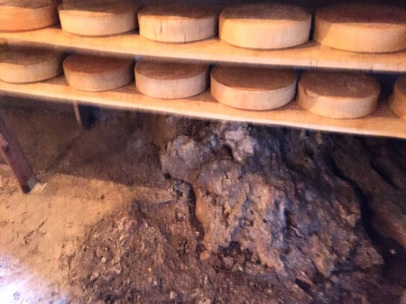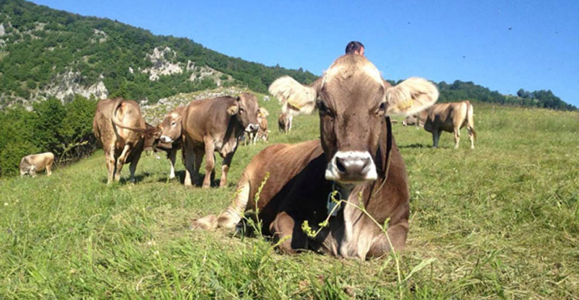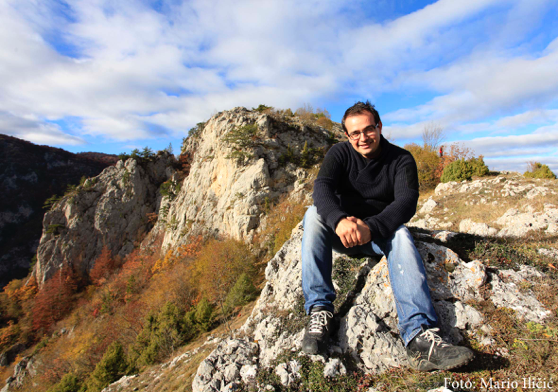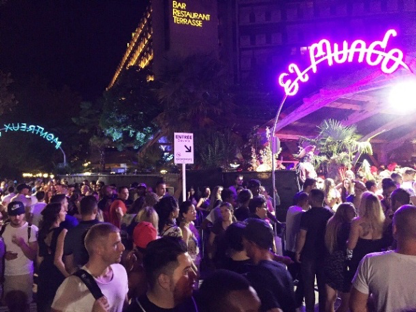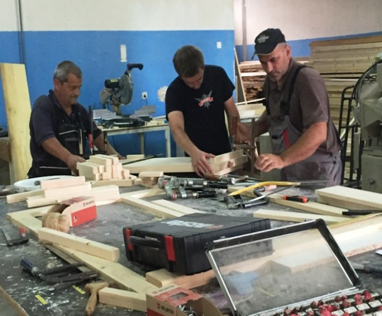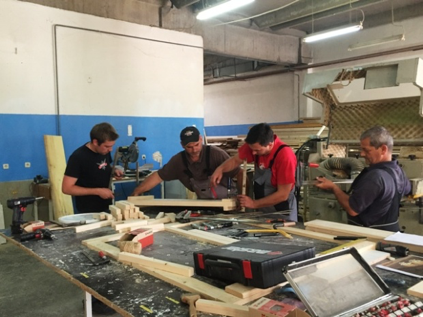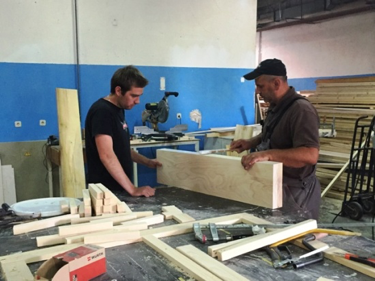The Man who produces Bosnian Gruyère Cheese: ''I just wanted to show that it could be done!''
Tatomir Jovičić, an event manager, is the owner of the company ''Task Force'' and the foundation ''El Mundo'' in Switzerland as well as of two companies in Bosnia and Herzegovina, ''Tatko'', a wood-processing company, and ''Zlatni sir'', a company producing Bosnian Gruyère cheese.
Companies ''Task Force'' and ''El Mundo'' owned by Tatomir Jovičić engage in music and cultural event management, from parking organisation, over ticket sales, transport of persons and equipment to everything else regarding music festivals and cultural event management. His companies have been cooperating with the Montreux Jazz Festival, one of the most important music festivals in Switzerland and worldwide, for the past 12 years. At the beginning, Tatomir only had a small bar at the Montreux Jazz Festival, which was growing every year, and now it is the central gathering place once the concerts finish, where people queue to get in. He has also been cooperating with the Label Suisse Festival, which has been organised for the past 14 years by the Swiss Radio and Television, a festival to which all main national bands are invited and which has more than 100,000 visitors. Tatomir is in charge of everything regarding F&B, ''food and beverages'', three stages and all needs of the artists. Other festivals that he cooperates with are Rock Oz'Arènes, Zofingen Heitere Open Air, Opus One and many other festivals in the French and German speaking part of the country.
Tatomir Jovičić came to Switzerland in 1992, when he was 18 years old. He was alone, as he himself says, and ''he learned everything completely by himself''.
''I immediately developed an interest in the way of life in Switzerland and started learning the language, which has helped me a lot. I began socialising with the Swiss, Italians, Portuguese and Spanish. It is truly such a richness that there are so many different nations in Switzerland. You have to have a positive attitude, to like people, to approach them with a smile, in a friendly and motivated manner. Our people sometimes put up resistance against inclusion, because they do not know the language and Swiss society that well and such resistance then prevents them from progressing as much as they actually could, given their capacities. Not everything was always running smoothly. There were all kinds of situations and obstacles, because there is a constant up and down in the business world, you face different dilemmas, the market is changing, the competition sharpens and it is always a daily fight. But, you know, when I wake up in the morning, I go to work happy, because I love what I do. I do work really a lot, but I love what I do, it makes me satisfied, I earn a normal income and I am therefore not afraid of any obstacles. I feel good here and, yes, I am satisfied''.
It all started when Tatomir made a cocktail stall with coconuts at a festival. Soon after this he created a whole campaign for the brand ''Malibu'' in order to promote these cocktails.
''I understood that it was very important to have good product packaging and that was the start of my cooperation with a company from Bosnia and Herzegovina, 'Bekto Precisa' from Goražde, which started producing mini shakers and various plastic items that I was selling at festivals in Switzerland. I chose the company ''Bekto Precisa'' because they are excellent; they have good technology and are able to produce more complicated items. The casting moulds that they use are extremely expensive in Switzerland, but 'Bekto Precisa', a company engaging in the innovation of casting moulds and packaging, is considerably more cost-effective. We were able to sell those products in the Swiss market without any problems''.
The next step that Tatomir took was to produce folding stalls for festivals that are easy and practical to transport. The stalls were made of wood and he immediately managed to sell 40 such stalls to the company Fosters Beer.
''Since the demand was big, I decided to establish a production company in Sarajevo, 'Tatko', which has been operating for 14 years already. It produces doors and windows, and the material we produce in Bosnia and Herzegovina is exported to Switzerland for the purpose of festivals. We produced deckchairs and ski stalls for Coca-Cola. You know, in the Swiss mountains you can find wooden ski stalls from Bosnia and Herzegovina!''
This company was the reason why Tatomir was frequently travelling to Bosnia and Herzegovina, socialising with people, discussing and meeting people throughout Bosnia and Herzegovina. His frequent visits to Bosnia and Herzegovina resulted in a new idea that lead to the establishment of a farm Zlatni sir (golden cheese), 43 km away from Foča, where Bosnian Gruyère cheese is produced.
''My grandfather lived in Sarajevo, he was a wood salesman and a long time ago he bought a piece of land on top of the Tara Canyon. My grandmother used to live there during summer after WWII with three children, to work the land, raise cattle and engage in agriculture. Every summer I spent a month at the farm to help my grandmother. I used to work, weed, plant, hoe, watch cows and sheep with peasants and get to know the area. My father would always rush to spend every weekend there and work the land. During the war in the 1990s, my grandmother was in Sarajevo, so that it all fell into disrepair and started to decay. After the war, my dad and I started working the land a bit to at least try to protect it from decay. However, in the whole area there were less and less peasants, cattle and farmers, everything was disappearing. And then, after the war, there were only elderly people that had a cow or two, three sheep and it was sad to see that. The Swiss are proud to see cows and sheep on their way to pasture, and we used to be like that, but now people in Bosnia and Herzegovina are unwilling to engage in agriculture and cattle breeding. The Swiss plan carefully and they are patient. If you buy two sheep, next year you will have four and the flock will grow, then you can also sell and earn money. I discussed all this with people in Bosnia and Herzegovina and to whom ever I would tell about my idea to establish a farm, they would tell me, no, that is impossible here, you cannot do anything here, the state is not providing any kind of assistance. I told them that Switzerland was not doing that either, maybe at a later stage, but one has to start himself/herself and produce something.
When my father died in Bosnia, I inherited the whole estate to take care of it. Given all the obligations I had, I could not afford it to take two to three months off and to take care of the estate during summer and plant potatoes, although I would have liked that very much. I had the obligation to maintain the estate, since all my ancestors had managed to do so, and I could not allow it to fall into disrepair. I therefore used my grandfather's estate to establish a high-quality cheese production farm together with Predrag Džakula, a business partner who worked with me in Switzerland. It is a Bosnian Gruyère cheese that we called 'Zlatni sir', golden cheese, and that is also the name of our farm. We analysed the grass, water, pasture conditions for the cows and started the adventure that has been lasting for already four years''.
Tatomir and his partner decided to import a Swiss breed, ''Swiss Brown'', which gives large quantities of milk. They imported 15 cows from Slovenia, since it was easier and cheaper than importing them from Switzerland.
''There were, of course, problems with documents, Bosnian officers, customs authorities, but that is not irresolvable and we did it all. Sometimes I had the impression that municipal officials thought that we were crazy and that we would not stay here for long (laughing)''.
It takes a year for ''Zlatni sir'', Bosnian Gruyère cheese, to ripen and Tatomir decided to set a high price in case of this high-quality cheese, although he was not sure that the market in Bosnia and Herzegovina would be willing to buy such an expensive cheese.
''Everyone was telling us that we were not normal, that all of it was expensive and different and that nobody would buy it. And then there was the 2015 Wine Fair at Hotel Europe in Sarajevo, which was attended by ambassadors, various national and foreign guests, and we were successful already on the first day. The quality of the cheese was evaluated as very good, everyone tried it and wanted to buy it. We were approached by representatives of well-known restaurants that wanted to buy the cheese. And indeed, today it is eaten at all well-known restaurants in Sarajevo. The price of the cheese is quite high for our market, but people buy it. Winemakers are also interested in buying the cheese. We had to buy more cows in order to ensure sufficient quantities of cheese to be sold next year. By the end of 2016 we will have 50 dairy cows. There are three people working at the farm, Predrag, my partner, and two more workers. The cows are outside, they graze, and we have a certificate stating that the cheese is organic''.
Since the farm ''Zlatni sir'' is located at 1200 meters above sea level, on top of Tara Canyon, Tatomir was facing two problems: inadequate roads and interruptions in power supply.
''The road is in a poor condition, and the municipality refused to repair it, stating that there was nobody staying that high. I asked them how they thought that people would go back and engage in agriculture if they do not make any repairs and investments in further development. We do achieve some progress and that motivates us to keep going. We progress, a bit in our Bosnian way, but the progress is there. The most important thing is the work. Our people stop and they quote all possible reasons as to why they cannot do something and then they even stop trying. But, if you work, if you make attempts all the time and are patient, then you can also make it.
The greatest problem was actually the import, because there are some laws that are not quite logical. But one has to be persistent, to talk to people, veterinarians, Faculty of Agriculture, municipality representatives, to explain all the time, and to make it happen. I also have to say that everyone tried to help us, because this farm is an unusual and original project, you know, they could not believe that someone would want to come to Bosnia and keep cows! (laughter). Usually people from rural areas do not wish to engage in agriculture and cattle breeding, although they have excellent conditions, and people from urban areas are more interested in this form of agriculture and wish to go to the countryside and work outdoors''.
Tatomir is already being contacted by families that would like to start mini milk farms and merge them into larger farms. He believes that in Bosnia and Herzegovina there are excellent conditions to raise cattle and produce milk and that it is important to maintain the quality of milk and cheese. Two families in Bosnia and Herzegovina and two families from Zlatibor mountain in Serbia have already imported cows and are ready to start making ''Zlatni sir'' as of November this year.
Tatomir explains what was his main motivation to start producing cheese in Bosnia and Herzegovina:
''The goal of this whole project was to show people that it can be done! When you come to Bosnia and Herzegovina and when you share any idea with the people, you immediately face a negative attitude that is mostly discouraging young people. They will tell you, this cannot be done here, you do not know how things are functioning here, it is complicated here, you do not understand, etc. We travelled a lot throughout Bosnia and Herzegovina, we talked to farmers, cattle breeders and people trying to set up farms, and everyone was telling us, you do not know it, it cannot be done, you will not be able to sell it, you do not live here, so you do not know... I just stubbornly wanted to show that it could be done. Then they were telling me, well you can do it because you came with the money from Switzerland. Of course, the money did help, but only to speed up the process. A person can start doing this also with five cows that cost less than half of a car that everyone is driving in Bosnia and Herzegovina and to then reach a position of having 50 cows in five to six years, to be able to live well off it, even for several families. The only thing that has to be done is the work. I did not expect the market in Bosnia and Herzegovina to react this well and I am more than satisfied''.
Tatomir also has ideas for new projects, including a tourism development project that would start in connection with the ''Zlatni sir'' farm.
''We already constructed three bungalows next to the farm. We recently had the French Ambassador as our guest, and the Japanese and Swiss ambassadors with their spouses were also our guests. The spouse of the Japanese Ambassador, she and her husband have been in the country for four years, told me that it was the most beautiful day in Bosnia and Herzegovina for her. The idea is to develop agro tourism and tourism in general, since the farm is located on top of the largest canyon in Europe. This is the second deepest canyon in the world, after the Grand Canyon in the USA, and it is really insufficiently used, except for rafting. We know that Bosnia and Herzegovina is a complicated country, but I do think that a lot can be achieved; one only needs to work and be persistent. It is a great pleasure to achieve something back home and have a reason to go there and enjoy one's home country''.
Tatomir Jovičić lives and works in Lausanne with his spouse and three children.
For further information please visit the website www.zlatnisir.com.

